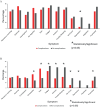Patient-Reported Outcomes During Neoadjuvant Therapy for Gastrointestinal Cancer and Their Association with Postoperative Complications
- PMID: 40601132
- PMCID: PMC12222371
- DOI: 10.1007/s12029-025-01268-y
Patient-Reported Outcomes During Neoadjuvant Therapy for Gastrointestinal Cancer and Their Association with Postoperative Complications
Abstract
Purpose: Neoadjuvant therapy (NT) given before surgery for gastrointestinal (GI) malignancies can lead to adverse events. Whether patient-reported outcomes (PRO) or quality of life (QOL) during NT is predictive of postoperative complications is unknown.
Methods: A planned secondary analysis of patients with GI cancers undergoing NT utilized a customized mobile-phone application (app) to measure real-time PROs and monthly QOL using FACT-G (Functional Assessment of Cancer Therapy-General). Among surgical patients, the association between QOL and PROs and postoperative Clavien-Dindo grade ≥ 2 complications was analyzed using univariate analyses.
Results: Among 104 patients enrolled, 69 (66%) underwent surgery following NT and 20 (28.9%) experienced 30-day complications. There were no differences in baseline demographics, NT duration, or cancer type between Complications and No Complications groups (all p > 0.05). QOL scores at NT start (mean FACT-G Complications 76.1 vs No Complications 75.2), and changes in QOL during NT did not differ between the two cohorts (p > 0.05). PRO entries of those who experienced complications were more likely to report lack of appetite (25.9% vs 14.2%; p < 0.001) and pain (36.6% vs 18.7%; p < 0.001) but less likely to report fatigue (31.9% vs 41.6%; p = 0.009), anxiety (18.1% vs 39.1%; p < 0.001), trouble sleeping (20.8% vs 39.1%; p < 0.001), lack of focus (5.6% vs 18.5%; p < 0.001), depression (0.5% vs 14%; p < 0.001), and frustration (13.9% vs 21.4%; p = 0.01).
Conclusion: In this prospective cohort study, specific PROs were associated with postoperative complications among those who underwent surgical resection. Further research is needed to assess whether preoperative PROs can guide patient-centered interventions mitigating postoperative complications.
Keywords: Colorectal cancer; Esophageal cancer; Hepatopancreatobiliary surgery; Patient-reported outcome measures; Preoperative therapy Pancreatic cancer.
© 2025. The Author(s).
Conflict of interest statement
Declarations. Ethics Approval: This study was performed in line with the principles of the Declaration of Helsinki. Approval was granted by the clinical scientific review committee and institutional review board of The Ohio State University (#2020C0071). Consent to Participate: Informed consent was obtained from all individual participants included in the study. Conflict of interest: The authors declare no competing interests.
Figures


Similar articles
-
What Are the Recurrence Rates, Complications, and Functional Outcomes After Multiportal Arthroscopic Synovectomy for Patients With Knee Diffuse-type Tenosynovial Giant-cell Tumors?Clin Orthop Relat Res. 2024 Jul 1;482(7):1218-1229. doi: 10.1097/CORR.0000000000002934. Epub 2023 Dec 28. Clin Orthop Relat Res. 2024. PMID: 38153106 Free PMC article.
-
Corticosteroids for the management of cancer-related fatigue in adults with advanced cancer.Cochrane Database Syst Rev. 2023 Jan 23;1(1):CD013782. doi: 10.1002/14651858.CD013782.pub2. Cochrane Database Syst Rev. 2023. PMID: 36688471 Free PMC article.
-
Medically assisted hydration for adults receiving palliative care.Cochrane Database Syst Rev. 2023 Dec 14;12(12):CD006273. doi: 10.1002/14651858.CD006273.pub4. Cochrane Database Syst Rev. 2023. PMID: 38095590 Free PMC article.
-
Preoperative medical therapy before surgery for uterine fibroids.Cochrane Database Syst Rev. 2017 Nov 15;11(11):CD000547. doi: 10.1002/14651858.CD000547.pub2. Cochrane Database Syst Rev. 2017. Update in: Cochrane Database Syst Rev. 2025 Apr 04;4:CD000547. doi: 10.1002/14651858.CD000547.pub3. PMID: 29139105 Free PMC article. Updated.
-
Neoadjuvant treatment for stage III and IV cutaneous melanoma.Cochrane Database Syst Rev. 2023 Jan 17;1(1):CD012974. doi: 10.1002/14651858.CD012974.pub2. Cochrane Database Syst Rev. 2023. PMID: 36648215 Free PMC article.
References
-
- Eyck BM, van Lanschot JJB, Hulshof M, van der Wilk BJ, Shapiro J, van Hagen P, van Berge Henegouwen MI, Wijnhoven BPL, van Laarhoven HWM, Nieuwenhuijzen GAP, et al. Ten-year outcome of neoadjuvant chemoradiotherapy plus surgery for esophageal cancer: the randomized controlled CROSS trial. J Clin Oncol. 2021;39(18):1995–2004. - PubMed
-
- Verheij FS, Omer DM, Williams H, Lin ST, Qin LX, Buckley JT, Thompson HM, Yuval JB, Kim JK, Dunne RF, et al. Long-term results of organ preservation in patients with rectal adenocarcinoma treated with total neoadjuvant therapy: the randomized phase II OPRA trial. J Clin Oncol. 2024;42(5):500–6. - PMC - PubMed
-
- Al-Batran SE, Homann N, Pauligk C, Goetze TO, Meiler J, Kasper S, Kopp HG, Mayer F, Haag GM, Luley K, et al. Perioperative chemotherapy with fluorouracil plus leucovorin, oxaliplatin, and docetaxel versus fluorouracil or capecitabine plus cisplatin and epirubicin for locally advanced, resectable gastric or gastro-oesophageal junction adenocarcinoma (FLOT4): a randomised, phase 2/3 trial. Lancet. 2019;393(10184):1948–57. - PubMed
-
- Sauer R, Becker H, Hohenberger W, Rödel C, Wittekind C, Fietkau R, Martus P, Tschmelitsch J, Hager E, Hess CF, et al. Preoperative versus postoperative chemoradiotherapy for rectal cancer. N Engl J Med. 2004;351(17):1731–40. - PubMed
MeSH terms
LinkOut - more resources
Full Text Sources
Medical
Research Materials
Miscellaneous
